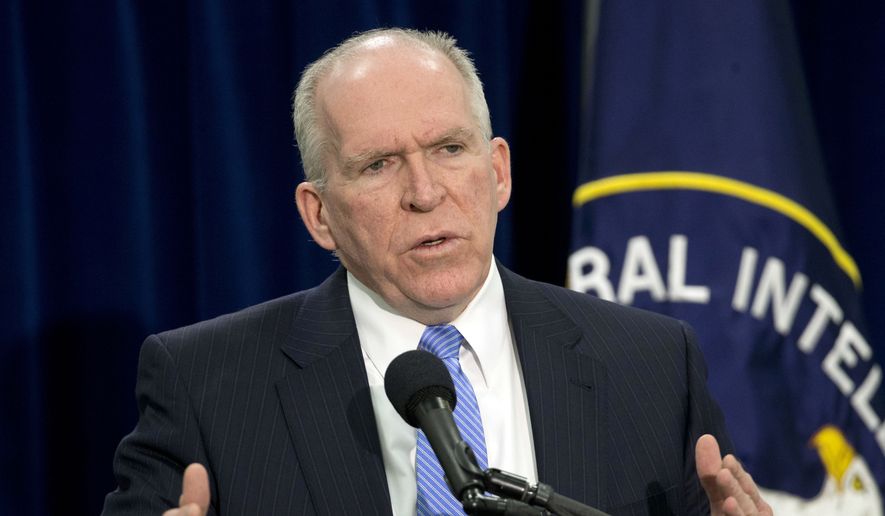Former President Barack Obama’s former top spy has provided the first public confirmation that the FBI possessed and studied the discredited anti-Trump dossier that made unverified criminal charges against the president’s campaign associates and others.
The full effect of the dossier — which began circulating in Washington in June, with periodic updates filled with sensational charges through December — is unknown. Press reports say it led or contributed to the FBI deciding to investigate Mr. Trump. Its charges began to appear in a smattering of press articles, Democratic talking points and social media during the campaign, though not always attributed.
Republican have begun to ask more questions about the dossier’s impact. Rep. Trey Gowdy of South Carolina, played that role when former CIA director John O. Brennan appeared Tuesday before the House Intelligence Committee.
“I know that there were efforts made by the bureau to try to understand whether or not any of the information in that was valid,” Mr. Brennan said of the 35-page document compiled by ex-British spy Christopher Steele and paid for by Democratic-tied Fusion GPS in Washington.
Mr. Gowdy asked Mr. Brennan: “Do you know whether any of the underlying allegations made in the Steele dossier were ever tested, probed, examined, cross-examined, whether the sources were examined for reliability, credibility?”
Mr. Brennan said he did not know. Asked if the CIA had relied on it, he gave a clipped “No.”
Mr. Steele’s full fury against Trump people was not known until the news website BuzzFeed posted the entire dossier on Jan. 10.
Mr. Steele’s central charge is that the Trump team collaborated with Russian agents to hack Democratic Party computers and steal emails later published by Wikileaks.
Mr. Trump has said the dossier is part of a witch hunt against him.
Whatever role the dossier played, former FBI Director James B. Comey on two occasions made it clear he does not want to discuss it in public.
At a hearing in March before the same House Intelligence Committee, with Mr. Comey as a witness, Republicans generally shied away from dossier questions.
In contrast, four Democrats embraced Mr. Steele and his work. Rep. Adam Schiff of California, the panels’ top Democrat, read repeatedly from its various memos, including unproven charges, as if they had been authenticated.
Rep. Joaquin Castro of Texas also read copiously from the dossier, praising it for what he said were its accuracies.
But Mr. Comey refused to acknowledge the FBI ever possessed or used the document.
Mr. Castro: “First, let me ask you, can you describe who Christopher Steele is?”
Mr. Comey: “No, I’m not gonna comment on that.”
Mr. Castro: “Are you investigating the claims made in the dossier?”
Mr. Comey: “I’m not gonna comment on that, Mr. Castro.”
During Mr. Comey’s next — and last appearance on Capitol Hill as FBI director — he again declined to acknowledge the dossier’s existence.
“Prior to the bureau launching the investigation of alleged ties between the Trump campaign and Russia, did anyone from the FBI have interactions with Mr. Steele regarding the issue?” said Senate Judiciary Committee Chairman Charles Grassley at a May 3 hearing.
“That’s not a question that I can answer in this forum,” Mr. Comey said.
Before and since those two hearings, no central charge in Mr. Steele’s dossier has been verified publicly. He specifically charges six people — four Trump associates and two Russians — with criminal activity. All have condemned the dossier as a work of rumor and fiction.
One target, Russian-born tech entrepreneur Aleksej Gubarev, has sued Mr. Steele for defamation. Mr. Steele’s final memo in December accused Mr. Gubarev of orchestrating a hacking campaign against the Democrats that used botnets to infect computers with pornography and bugging malware.
The lawsuit forced Mr. Steele for the first time to discuss how he investigated Mr. Trump. He acknowledged in a court filing in London that his memo about Mr. Gubarev was never verified and that his full dossier was never supposed to be made public by his paymaster, Fusion GPS or BuzzFeed.
Mr. Comey met behind closed doors with Mr. Grassley, Iowa Republican, before his May 3 appearance. Mr. Grassley had sent letters to the FBI asking it to spell out its exact relationship with Mr. Steele and the degree to which it relied on his allegations.
Based on a follow-up letter from Mr. Grassley, it appears that Mr. Comey distanced himself from the dossier when he met with the senator.
• Rowan Scarborough can be reached at rscarborough@washingtontimes.com.




Please read our comment policy before commenting.